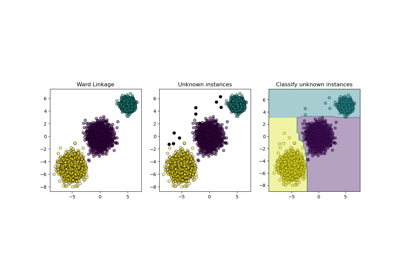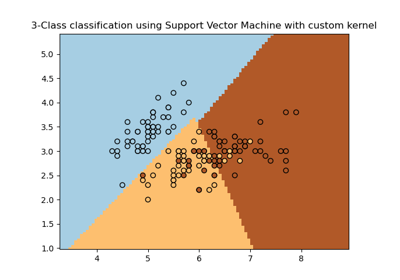Note
Go to the end to download the full example code. or to run this example in your browser via JupyterLite or Binder
__sklearn_is_fitted__ as Developer API#
The __sklearn_is_fitted__ method is a convention used in scikit-learn for
checking whether an estimator object has been fitted or not. This method is
typically implemented in custom estimator classes that are built on top of
scikit-learn’s base classes like BaseEstimator or its subclasses.
Developers should use check_is_fitted
at the beginning of all methods except fit. If they need to customize or
speed-up the check, they can implement the __sklearn_is_fitted__ method as
shown below.
In this example the custom estimator showcases the usage of the
__sklearn_is_fitted__ method and the check_is_fitted utility function
as developer APIs. The __sklearn_is_fitted__ method checks fitted status
by verifying the presence of the _is_fitted attribute.
An example custom estimator implementing a simple classifier#
This code snippet defines a custom estimator class called CustomEstimator
that extends both the BaseEstimator and ClassifierMixin classes from
scikit-learn and showcases the usage of the __sklearn_is_fitted__ method
and the check_is_fitted utility function.
# Authors: The scikit-learn developers
# SPDX-License-Identifier: BSD-3-Clause
from sklearn.base import BaseEstimator, ClassifierMixin
from sklearn.utils.validation import check_is_fitted
class CustomEstimator(BaseEstimator, ClassifierMixin):
def __init__(self, parameter=1):
self.parameter = parameter
def fit(self, X, y):
"""
Fit the estimator to the training data.
"""
self.classes_ = sorted(set(y))
# Custom attribute to track if the estimator is fitted
self._is_fitted = True
return self
def predict(self, X):
"""
Perform Predictions
If the estimator is not fitted, then raise NotFittedError
"""
check_is_fitted(self)
# Perform prediction logic
predictions = [self.classes_[0]] * len(X)
return predictions
def score(self, X, y):
"""
Calculate Score
If the estimator is not fitted, then raise NotFittedError
"""
check_is_fitted(self)
# Perform scoring logic
return 0.5
def __sklearn_is_fitted__(self):
"""
Check fitted status and return a Boolean value.
"""
return hasattr(self, "_is_fitted") and self._is_fitted
Related examples




